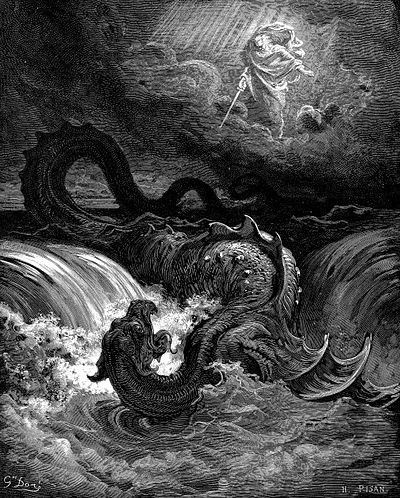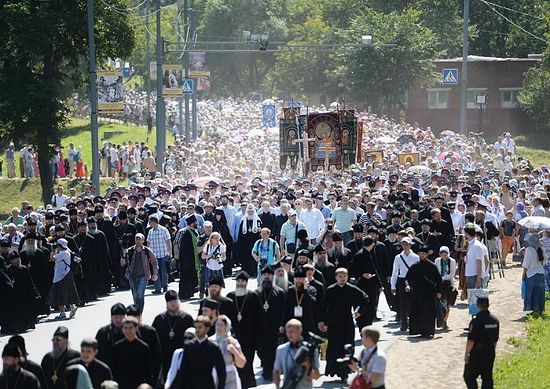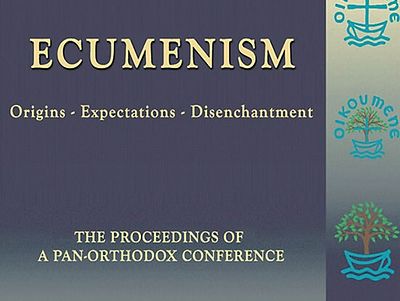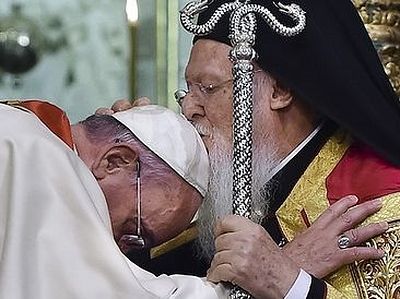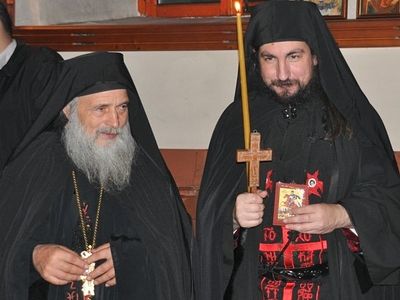I beseech you therefore, brethren, by the mercies of God, that you present your bodies a living sacrifice, holy, acceptable to God, which is your reasonable service. And do not be conformed to this world, but be transformed by the renewing of your mind, that you may prove what is that good and acceptable and perfect will of God. (Rom 12:1-2)
The ideas of the modern project have been in place for over three centuries. Across that time they have come to permeate every aspect of our lives. They shape our institutions and the way we think about them. They shape our understanding of what it means to be human. They shape our instincts and gut reactions. Given the Apostolic commandment to “not be conformed to this world” we rightly struggle to be transformed and to have our minds renewed according to the truth. This work of renewal requires careful thought and reflection and the willingness to have our hearts changed through the daily efforts of repentance. All of this lies at the heart of my frequent writings and critique of modernity. We cannot refuse conformity to this world if we do not see it for what it is. How we think of the Church is a crucial part of the modern project – for, in large part, it was in reaction to classical Christianity and the Church that modernity came into existence. It is worth noting that with regards to the Church, the project has almost been entirely successful.
To think carefully about this, we need to look at the position of the Church prior to the rise of modernity. In Western Europe, the Church was synonymous with the Catholic Church. In thinking about this, lay aside issues you might have with Catholicism itself or the Papacy and simply think about the position of the Church. All of the peoples of Western Europe were Christian, and all were members of the One Church (as far as the West was concerned). In large measure, they lived in peace with one another. When Henry II of England went to war in France, it was not a case of England versus France. Rather, it was the claim of a king to territory that he believed to be his by right. The French were not his enemies – indeed they had been subjects of the English king from time to time. Rather it was the Dauphin and his noblemen that constituted the challenge.
In such struggles the Church could and did frequently intervene. Sometimes the Church was sought out as mediator. In daily life, the parish Church permeated every aspect of life. In Eamon Duffy’s exceptional book, The Voices of Morebath, a single parish in a single village are examined in detail over the period of 50 years, spanning the years of the English Reformation. It is a case study in the radical reshaping of every aspect of life and an example in particular of the movement from the classical Christian world to the foundations of modernity. It is also clearly demonstrated that this reshaping was in no way a popular uprising and force of history. It was a conscious, ideological imposition by the state and certain religious forces that enjoyed state sponsorship.
The picture of the pre-reformation parish was of a Church life that permeated every aspect of culture. Every trade guild had its place and role in the Church. The culture was itself but the public expression of the Church’s life. We learn the names and details of individual lives in Duffy’s work as he draws from the records of those 50 years. And we see the changes. What we see is, interestingly, the secularization of parish life and the substitution of the state in places that had once belonged to the Church. Prior to the Reformation, the European state was integrated with Church, even an aspect of Church in many ways. At the end of the Reformation, the state had begun to take the shape of the modern state. Prior to the Reformation, the king’s subjects are the Christian people of the realm. After the Reformation, they are Englishmen, etc. above all else. It is worth noting that the nation state first comes into existence in Protestant lands. It was a slow and fitful, even very late development in Catholic lands.
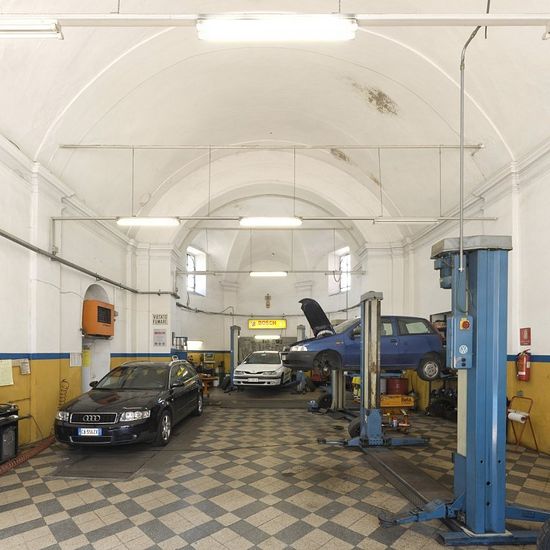 There is now an auto-repair shop in the former church in the Como community on lake Como. Where worshippers formerly dipped their fingers into the stoup with holy water and made the sign of the cross before entering the church, now drivers can change engine oil in their cars.
There is now an auto-repair shop in the former church in the Como community on lake Como. Where worshippers formerly dipped their fingers into the stoup with holy water and made the sign of the cross before entering the church, now drivers can change engine oil in their cars.
Today’s denominational form of the Church is itself a creation of the modern project. It is incorrect to see it as an inner project of late Christianity. It was never an intentional plan, but is the result of modern principles consistently set in place. The Church is steadily diminished in the life of the nation, privatized and relativized. Its loyalty becomes subsidiary to the loyalty of the State. The Church need not be One, indeed, it is the more easily reduced to subsidiarity if it is not One. The Church can no longer challenge the actions of the state, for it’s far too busy arguing with other Churches over one thing and another. Today, it is the state that appears as the most natural institution in modern society. The Church is a private matter, best served if it stays out of the “public” business.
Stanley Hauerwas at Duke once noted that the rise of the nation state and its success could be seen in its wars. Prior to the Reformation, Christians attacked and killed non-Christians. After the Reformation, Christians were glad to kill each other in the name of the state. The madness of the First World War is the apotheosis of the modern world. All history since can easily be seen as nothing more than the continued working out of the problems created in that conflict. In truth, we are still in the very same war. But the larger war of modernity waged against the classical world has been generally settled for more than two centuries. The state today enjoys a place within the minds of its citizens that includes a loyalty once only enjoyed by the Church.
The monopoly of the state is an interesting feature of the modern world. If I were to suggest that the institutions of the state be treated like the institutions of denominational Christianity, I would be taken for a madman. On your street, one family is German, another is Polish, another is Greek and a third counts themselves as American. Each of you has separate loyalties. If they have political or state needs, they apply to their own preferred identity. You can change “nationality” pretty much at will. Some people have been members of a half dozen different states, depending on who has the more attractive programs, etc. While this sounds crazy, it is in fact rendered absurd mostly because of its ineffectiveness in organizing war. It would be the state as gelding. But this describes the reality of denominational Christianity. It is only the Body of Christ, after a fashion, but one that has been gelded and made irrelevant and beside-the-point. If you have “religious needs” or you’re “into that sort of thing,” then Church is nice. But in no way is it The Church.
The success of modernity has been to reduce The Church into an idea, a concept. When Christians of the modern world think of Christian unity, they mean something vague and ethereal, mostly including mutual recognition of sacraments, and open communion. And though American Christians often like to fantasize about a coming persecution, the truth is that they’re simply not worth the effort.
In the countries of Eastern Europe and Russia, the Church (Orthodox or Catholic) was a largely unreformed entity. It retained its identity as the One Church and its place in the lives of the people and the culture. What Pope John Paul II said in Poland could bring down a government. They feared him. And though the Church in Russia was deeply wounded by a sustained persecution of 70 years’ length, it remained. Nothing replaced it, nor was it gelded. In Romania, when the Ceaușescus were overthrown, the announcement on the radio was, “The anti-Christ is dead! Romania is a Christian country!” That carried power because Romania was 95 per cent Orthodox. The Church had continued to exist in an unreformed condition. Such an announcement in America would naturally bring the question, “Which Christians?” Indeed, many Christians in America today think that their nation is a Christian nation. It is not, nor has it ever been. It has been a country without The Church.
All of this brings me to the ecumenical question. For ecumenism is a deeply modern movement. Indeed, it can be said to be an unthinkable movement apart from the concepts of modernity. It is not a movement towards the One Church. It is a movement that assures that One Church will never happen because the inner consciousness of its people will have been completely conformed to this world.
What is modern about the contemporary ecumenical movement?
The consciousness of the ecumenical movement is of the Church as an abstraction. Beginning primarily in the 18th and 19th centuries, the notion of the Church as an “invisible” or “mystical” reality, not entirely identified with any earthly institution arose. It becomes the “churchless Church.” It could just as easily be asserted that everyone on earth is a citizen of the same country, that individual nations are not actually true nations, but only human constructions of the real nation.
But the Church, as taught by Christ and as established in actual history, is not “invisible” or “mystical” in any sense that abstracts it from the concrete historical manifestation of that Church in the world. Just as the Body and Blood of Christ in the Eucharist are not somehow abstracted from Christ in any way, so the Body of Christ that is the Church, is just as concrete and real as the Incarnate Christ Himself. Indeed it cannot be otherwise. St. Paul’s challenge to any other concept is simple: “Is Christ divided?” (1 Cor. 1:13). That the answer could be anything but “no” was unthinkable to him. The Church is “One,” in the words of the Creed. It cannot possibly be two, much less 20,000.
That the Church is One is a sign that it is the creation of the One God. As soon as this is removed from human consciousness or its meaning rendered inert, the Church is reduced to a human institution, a lesser reality among other lesser things. And while the Church is reduced to a multiplicity of human creations, the state retains its unity and authority from God (Romans 13:1). It is ironic in addition to being false.
But the modern project has so deluded Christians that they cannot face the topic of the One Church with anything more than shame, defensiveness and denials of what was, and is, a clear, fixed, Apostolic doctrine. And I recognize that in even broaching the topic, I set some readers’ teeth on edge. But I beg a short indulgence.
For once, quit taking ownership of a false consciousness created by modernity itself. Denominational Christianity is not your fault, nor is it worthy of defending. Allow yourself to consider what the reality of “One, Holy, Catholic and Apostolic” means when not reduced to an abstraction or some eschatological dream. We do not confess that the Church shall be “One, Holy, etc.” We confess what is true. And that phrase means what it meant, and it was not and is not an abstraction.
Allow it to stand as true on its face, and then ponder the current modernized, diminished ecclesiology. But refuse to reconcile the two by acquiescing to modernist claims.
The pressure of ecumenism (which is not about unity but about diminishing the ecclesiology of the faith) has been felt deeply within Roman Catholicism. The document Lumen Gentiumin Vatican II, declares that the Mystical Body of Christ “subsists” in the Catholic Church, thus no longer saying that the two are one and the same. It seemed a gesture of generosity, but it was a capitulation to the centuries-old demands of modernity. Orthodoxy feels the same pressure, and there are some within it who would gladly embrace such language. It is a fulcrum point, and modernity has its hand on the lever.
At stake is not just the true character of the Church and the Kingdom, but also the outrageous and unchallenged claims of the modern state. That Leviathan is currently eating the souls of its citizens and would gladly swallow the Church itself. We should refuse to come to the table.
